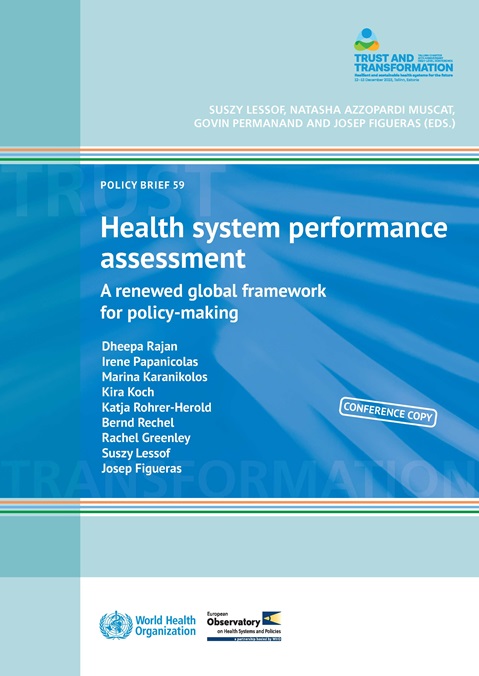Health system performance assessment: A renewed global framework for policy-making
Policy Brief 59
12 December 2023
| Policy brief

Overview
Sign up to be notified when the final briefs become available.
The key messages of this policy brief published by the European Observatory on Health Systems and Policies are as follows:
Health systems performance assessment (HSPA) is about helping decision-makers to work through performance challenges in context, that is, in light of what drives their own health system and its outcomes, to make better informed choices about change.
- The renewed global HSPA Framework is a tool that maps how health systems fit together and explains how they perform. It enables policy-makers to:
- pinpoint the root causes of performance issues and health system bottlenecks;
- design appropriate responses that reflect where the issues sit in terms of health system functions and subfunctions, intermediate objectives and final goals;
- test planned policy actions by working through plausible pathways from the roots of underperformance, through the feasibility of different policy actions to impacts and goals;
- identify and tackle policy areas to best strengthen health systems resilience; and
- put health system issues in a wider socioeconomic and societal context.
- Health systems have porous boundaries but act on wider societal goals through a complex iteration of functions, intermediate objectives and goals.
- The global HSPA Framework is based on the consensus reached by a coalition of countries, key stakeholders and civil society coordinated by WHO (UHC2030). It reflects a rigorous review of existing tools by the UHC2030 Technical Working Group on Health System Assessments, which included Member States, global health organizations, key players like the European Commission, the OECD and the World Bank, donors and academia, and agreed a harmonized approach to assessment.
- The new elements of the framework are about learning from the pandemic and bringing to the fore those existing elements that proved particularly policy- relevant. These include the following.
- Governance and multisectoral action, because engaging all stakeholders (including the population and health professionals) and collaboration across sectors are critical to defining and achieving shared, goals.
- Patients and people to recognize more explicitly how crucial the voice of patients and the public and of civil society are to decision-making processes.
- Health workforce which was already a key part of resource generation but which is recognized as ever more important is ensuring service delivery supports final health system goals.
- Digital health, which is pivotal in enhancing access and efficiency, patient-centred approaches, and timely, data-driven decision-making.
- Environmental considerations, because climate change will be a major driver of health system utilization, while the health sector itself has a detrimental impact on the environment.
- Health security, which is derived from the intricate network of performance and resilience links between the functions, and between the functions and goals.
- Resilience, or the capacity to adapt and absorb shocks and bounce back.
- The health system plays a significant role in contributing to larger societal objectives and to well-being, for example by fostering cohesion and supporting economic development.
- The global HSPA Framework chimes with the values and aims of the Tallinn conference. It:
- underpins trust providing a transparent map of where change is needed, what performance measurements mean and what the impacts of innovation will be;
- anchors transformation, identifying what is not working, suggesting solutions and setting out a clear structure and plausible pathways for change; and
- is a practical tool for building resilience assessing vulnerabilities and guiding the development of remedial policy action.
The other Tallinn policy briefs:
WHO Team
European Observatory on Health Systems and Policies
Editors
Dheepa Rajan,
Irene Papanicolas,
Marina Karanikolos,
Kira Koch,
Katja Rohrer-Herold,
Bernd Rechel,
Rachel Greenley,
Suszy Lessof,
Josep Figueras
Number of pages
58
Reference numbers
ISBN: 1997-8073